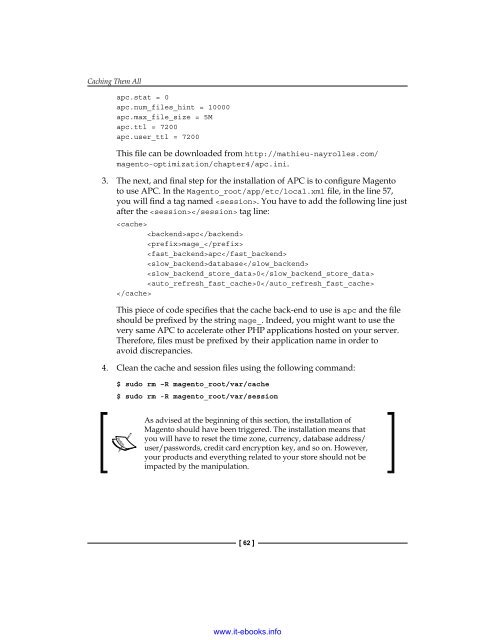Magento Site Performance Optimization
You also want an ePaper? Increase the reach of your titles
YUMPU automatically turns print PDFs into web optimized ePapers that Google loves.
Caching Them All<br />
apc.stat = 0<br />
apc.num_files_hint = 10000<br />
apc.max_file_size = 5M<br />
apc.ttl = 7200<br />
apc.user_ttl = 7200<br />
This file can be downloaded from http://mathieu-nayrolles.com/<br />
magento-optimization/chapter4/apc.ini.<br />
3. The next, and final step for the installation of APC is to configure <strong>Magento</strong><br />
to use APC. In the <strong>Magento</strong>_root/app/etc/local.xml file, in the line 57,<br />
you will find a tag named . You have to add the following line just<br />
after the tag line:<br />
<br />
apc<br />
mage_<br />
apc<br />
database<br />
0<br />
0<br />
<br />
This piece of code specifies that the cache back-end to use is apc and the file<br />
should be prefixed by the string mage_. Indeed, you might want to use the<br />
very same APC to accelerate other PHP applications hosted on your server.<br />
Therefore, files must be prefixed by their application name in order to<br />
avoid discrepancies.<br />
4. Clean the cache and session files using the following command:<br />
$ sudo rm –R magento_root/var/cache<br />
$ sudo rm -R magento_root/var/session<br />
As advised at the beginning of this section, the installation of<br />
<strong>Magento</strong> should have been triggered. The installation means that<br />
you will have to reset the time zone, currency, database address/<br />
user/passwords, credit card encryption key, and so on. However,<br />
your products and everything related to your store should not be<br />
impacted by the manipulation.<br />
[ 62 ]<br />
www.it-ebooks.info


